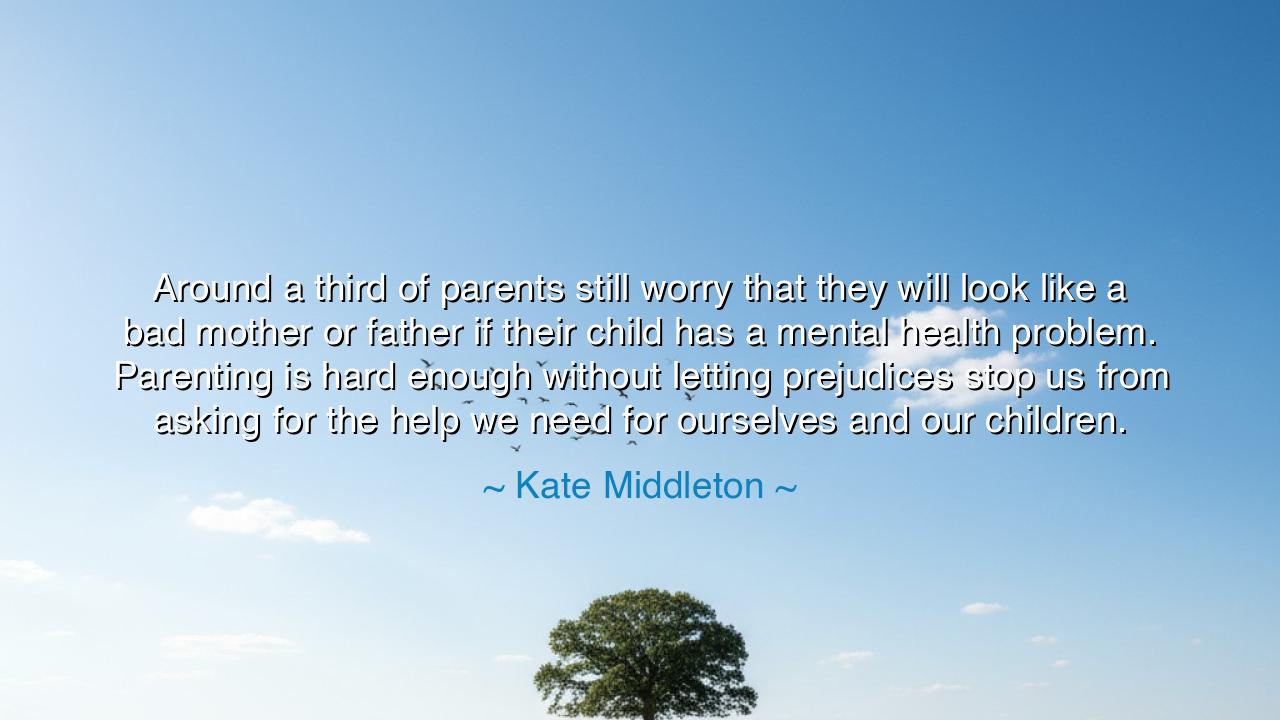
Around a third of parents still worry that they will look like a
Around a third of parents still worry that they will look like a bad mother or father if their child has a mental health problem. Parenting is hard enough without letting prejudices stop us from asking for the help we need for ourselves and our children.






Hear the voice of Kate Middleton, Princess of Wales, who speaks with compassion and urgency: “Around a third of parents still worry that they will look like a bad mother or father if their child has a mental health problem. Parenting is hard enough without letting prejudices stop us from asking for the help we need for ourselves and our children.” These words strike at the heart of a silent struggle, one that has haunted parents across ages and cultures: the fear not only of their child’s suffering, but of society’s judgment. Here is truth unveiled—that stigma can wound as deeply as the ailment itself, and that shame can chain those who most need freedom.
In ancient days, weakness of the mind was misunderstood, feared, and cast aside. The Greeks spoke of melancholy as divine punishment, the Romans often shrouded it in silence, and even in later centuries, parents bore the burden of disgrace if their child strayed from the image of strength and health. But Middleton’s words pierce through this veil of ignorance. She reminds us that mental health is not a mark of parental failure, nor a curse upon a household, but a reality of human life, as natural as the wounds of the body. The true shame lies not in the struggle, but in a world that still dares to attach guilt to it.
Consider the story of Abraham Lincoln, who carried the heavy cloak of depression throughout his life. His mother, Nancy Hanks, died when he was still a boy, and grief never released its hold on him. Yet his suffering did not mean his family failed him, nor that he was broken beyond repair. Instead, it became the crucible that tempered him into one of history’s greatest leaders. But imagine if his pain had been hidden out of fear of judgment, if those around him had chosen silence instead of care. The world may never have seen the strength that was born of his struggle. Thus, Kate Middleton’s words call us to courage: never let prejudice prevent healing.
The prejudice she names is a cruel chain. It whispers to parents that asking for help is weakness, that admitting struggle will invite scorn. But this is falsehood. True weakness is silence; true strength is to lift the veil and seek aid. The wise parent knows that love is not proved by perfection, but by the willingness to fight for their child’s well-being, even if it means standing against the weight of social judgment. To allow pride or fear to keep us from help is to abandon the very duty we hold sacred.
Yet Middleton also speaks of parenting as already hard enough. The journey of raising children is among life’s greatest labors, filled with sleepless nights, endless worry, and unceasing sacrifice. Why then should we make it harder still by adding shame to suffering? Just as the farmer seeks tools to till the soil, and the soldier seeks armor for the battle, so too must parents seek support when the road becomes too heavy. To do so is not failure, but wisdom—it is the recognition that no one stands alone in the great work of raising the next generation.
The lesson here is clear: let go of the fear of judgment, and embrace the strength of honesty. If a child suffers, seek help without shame. If a parent feels overwhelmed, speak without fear. The walls of prejudice fall only when voices rise to challenge them. Each act of honesty is a blow against silence, each request for aid a step toward a world where mental health is treated with compassion rather than suspicion.
Therefore, let all who hear these words take action: create spaces of openness, offer support without judgment, and honor the bravery of those who seek help. If you are a parent, remember that your worth is not measured by the absence of struggle, but by the presence of love and the courage to act. If you are a neighbor or friend, remember that your response can either deepen stigma or lift the burden. Choose always to lift.
Thus Kate Middleton’s words, spoken with grace and clarity, become not only a call to parents but a call to all humanity. For in tearing away the cloak of prejudice, we make the path of parenting lighter, the burden of children gentler, and the fabric of society stronger. And in this, we honor not only our children, but the generations yet to come.






AAdministratorAdministrator
Welcome, honored guests. Please leave a comment, we will respond soon